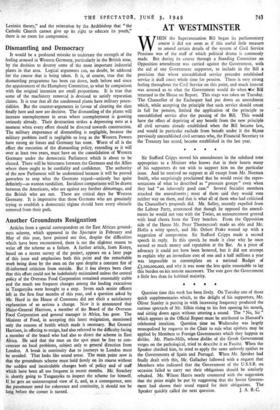Dismantling and Democracy
It would be a profound mistake to underrate the strength of the feeling aroused in Western Germany, particularly in the British zone, by the decision to destroy some of the most important industrial plants in that area. Logical arguments can, no doubt, be adduced for the course that is being taken. It is, of course, true that the dismantling programme has been cut down, both before and since the appointment of the Humphrey Committee, to what by comparison with the original intention are small proportions. It is true that some of the machinery removed is destined to satisfy reparation claims. It is true that all the condemned plants have military poten- tialities. But the counter-arguments in favour of cleaning the slate finally here and now are decisive. The dismantling of the plants will increase unemployment in areas where unemployment is growing seriously already. Their destruction strikes a depressing note at a moment when every effort should be directed towards construction. The military importance of dismantling is negligible, because the military problem itself is negligible so long as the Western Powers have strong air forces and Germany has none. Worst of all is the effect the execution of the dismantling policy, extending as it will over at least two years, must have on the consolidation of Western Germany under the democratic Parliament which is about to be elected. There will be bitterness between the Germans and the Allies where there ought to be cordiality and confidence. The authority of the new Parliament will be undermined because it will be proved powerless to stop what the Germans regard—unjustly but quite definitely—as wanton vandalism. Invidious comparisons will be drawn between the Americans, who are against any further clemontage, and the British who are not. These are critical days for Western Germany. It is imperative that those Germans who are genuinely trying to establish a democratic regime should have every obstacle removed from their path.


































 Previous page
Previous page